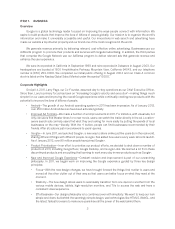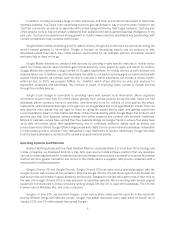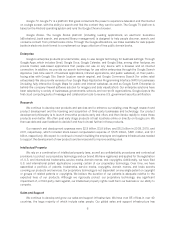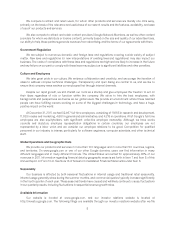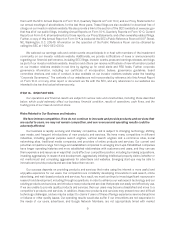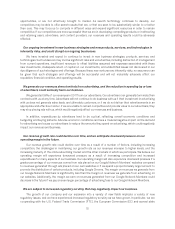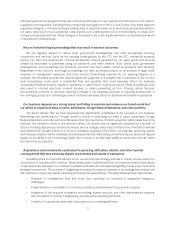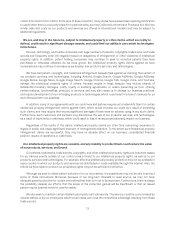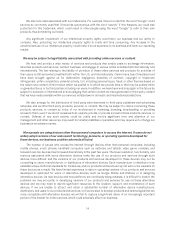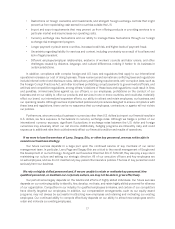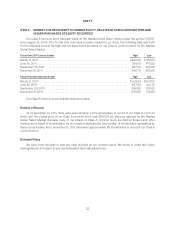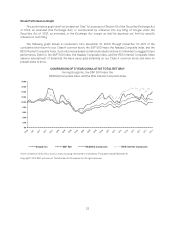Google 2011 Annual Report Download - page 42
Download and view the complete annual report
Please find page 42 of the 2011 Google annual report below. You can navigate through the pages in the report by either clicking on the pages listed below, or by using the keyword search tool below to find specific information within the annual report.collect information from minors. In the area of data protection, many states have passed laws requiring notification
to users when there is a security breach for personal data, such as California’s Information Practices Act. We face
similar risks and costs as our products and services are offered in international markets and may be subject to
additional regulations.
We are, and may in the future be, subject to intellectual property or other claims, which are costly to
defend, could result in significant damage awards, and could limit our ability to use certain technologies
in the future.
Internet, technology, and media companies own large numbers of patents, copyrights, trademarks, and trade
secrets and frequently enter into litigation based on allegations of infringement or other violations of intellectual
property rights. In addition, patent holding companies may continue to seek to monetize patents they have
purchased or otherwise obtained. As we have grown, the intellectual property rights claims against us have
increased and may continue to increase as we develop new products, services, and technologies.
We have had patent, copyright, and trademark infringement lawsuits filed against us claiming that certain of
our products, services, and technologies, including Android, Google Search, Google AdWords, Google AdSense,
Google Books, Google News, Google Image Search, Google Chrome, Google Talk, Google Voice, and YouTube,
infringe the intellectual property rights of others. Adverse results in these lawsuits may include awards of
substantial monetary damages, costly royalty or licensing agreements, or orders preventing us from offering
certain features, functionalities, products, or services, and may also cause us to change our business practices,
and require development of non-infringing products or technologies, which could result in a loss of revenues for us
and otherwise harm our business.
In addition, many of our agreements with our customers and partners require us to indemnify them for certain
intellectual property infringement claims against them, which would increase our costs as a result of defending
such claims, and may require that we pay significant damages if there were an adverse ruling in any such claims.
Furthermore, such customers and partners may discontinue the use of our products, services, and technologies,
as a result of injunctions or otherwise, which could result in loss of revenues and adversely impact our business.
Regardless of the merits of the claims, intellectual property claims are often time consuming, expensive to
litigate or settle, and cause significant diversion of management attention. To the extent such intellectual property
infringement claims are successful, they may have an adverse effect on our business, consolidated financial
position, results of operations, or cash flows.
Our intellectual property rights are valuable, and any inability to protect them could reduce the value
of our products, services, and brand.
Our patents, trademarks, trade secrets, copyrights, and other intellectual property rights are important assets
for us. Various events outside of our control pose a threat to our intellectual property rights, as well as to our
products, services and technologies. For example, effective intellectual property protection may not be available in
every country in which our products and services are distributed or made available through the internet. Also, the
efforts we have taken to protect our proprietary rights may not be sufficient or effective.
Although we seek to obtain patent protection for our innovations, it is possible we may not be able to protect
some of these innovations. Moreover, because of our long-term interests in open source, we may not have
adequate patent protection for certain innovations that later turn out to be important. Furthermore, there is always
the possibility, despite our efforts, that the scope of the protection gained will be insufficient or that an issued
patent may be deemed invalid or unenforceable.
We also seek to maintain certain intellectual property as trade secrets. The secrecy could be compromised by
outside parties, or by our employees, which would cause us to lose the competitive advantage resulting from these
trade secrets.
13


